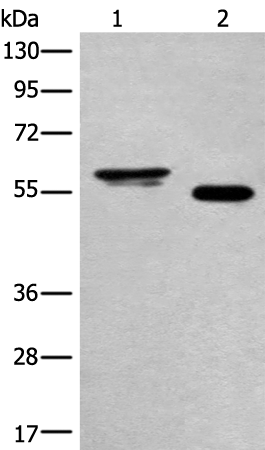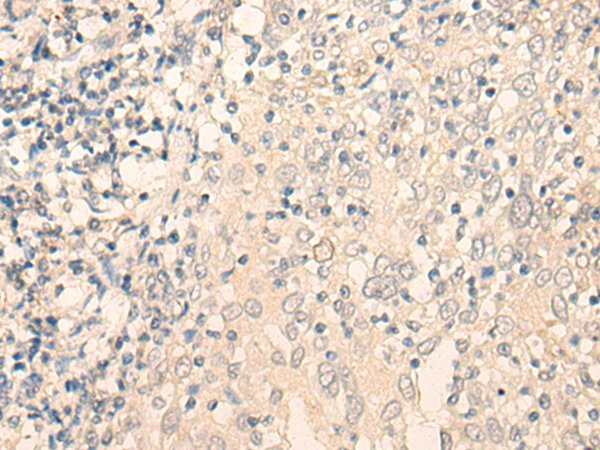

| WB | 咨询技术 | Human,Mouse,Rat |
| IF | 咨询技术 | Human,Mouse,Rat |
| IHC | 1/25-1/100 | Human,Mouse,Rat |
| ICC | 技术咨询 | Human,Mouse,Rat |
| FCM | 咨询技术 | Human,Mouse,Rat |
| Elisa | 1/5000-1/10000 | Human,Mouse,Rat |
| WB Predicted band size | 63 kDa |
| Host/Isotype | Rabbit IgG |
| Antibody Type | Primary antibody |
| Storage | Store at 4°C short term. Aliquot and store at -20°C long term. Avoid freeze/thaw cycles. |
| Species Reactivity | Human, Mouse |
| Immunogen | Fusion protein of human HAS3 |
| Formulation | Purified antibody in PBS with 0.05% sodium azide and 50% glycerol. |
+ +
以下是与HAS3抗体相关的3篇参考文献及其摘要信息:
1. **"Hyaluronan synthase 3 regulates tumor angiogenesis via modulation of HAS3-dependent extracellular vesicles"**
- **作者**: Tammi R et al.
- **摘要**: 该研究揭示了HAS3通过调控细胞外囊泡中的透明质酸合成,影响肿瘤血管生成。研究使用特异性HAS3抗体验证了其在肿瘤微环境中的表达,并证明其与肿瘤进展和血管生成标志物的相关性。
2. **"Development and characterization of a monoclonal antibody specific for human hyaluronan synthase 3"**
- **作者**: Itano N et al.
- **摘要**: 研究团队开发了一种针对人源HAS3的单克隆抗体,并通过免疫印迹和免疫荧光验证其特异性。该抗体可用于检测HAS3在多种癌细胞系及组织中的表达,为研究HAS3功能提供了重要工具。
3. **"HAS3-induced hyaluronan synthesis promotes epidermal hyperplasia in inflammatory skin diseases"**
- **作者**: Vigetti D et al.
- **摘要**: 文章探讨了HAS3在炎症性皮肤病中通过增加透明质酸合成导致表皮增生的机制。通过HAS3抗体的免疫组化分析,发现HAS3在银屑病等疾病组织中高表达,并与炎症因子IL-6和TNF-α的调控相关。
4. **"Targeting HAS3 in pancreatic cancer: antibody-based inhibition suppresses metastasis"**
- **作者**: Chen L et al.
- **摘要**: 该研究利用HAS3特异性抗体阻断胰腺癌细胞中HAS3的功能,发现可显著抑制肿瘤细胞的迁移和侵袭能力,提示HAS3可能作为胰腺癌治疗的潜在靶点。
以上文献均聚焦于HAS3抗体的开发、验证或其在疾病机制研究中的应用,覆盖癌症、皮肤病等领域。
The HAS3 (hyaluronan synthase 3) antibody is a research tool designed to detect and study the expression and function of the HAS3 enzyme, a member of the hyaluronan synthase family. HAS3 catalyzes the synthesis of hyaluronic acid (HA), a major glycosaminoglycan in the extracellular matrix (ECM) involved in cell adhesion, migration, and tissue hydration. Unlike HAS1 and HAS2. HAS3 produces shorter HA chains and is associated with dynamic cellular processes, including inflammation, cancer progression, and wound healing. Its expression is upregulated in various pathological conditions, such as tumors, osteoarthritis, and fibrotic diseases, where HA overproduction contributes to disease mechanisms.
HAS3 antibodies are typically monoclonal or polyclonal reagents used in techniques like Western blotting, immunohistochemistry, and immunofluorescence to localize and quantify HAS3 in cells or tissues. These antibodies help elucidate HAS3's role in HA-mediated signaling pathways, ECM remodeling, and interactions with cell surface receptors like CD44. Research using HAS3 antibodies has highlighted its involvement in cancer cell invasiveness, angiogenesis, and resistance to therapies, making it a potential therapeutic target. However, cross-reactivity with other HAS isoforms remains a challenge, necessitating careful validation. Overall, HAS3 antibodies are vital for exploring HA biology and its implications in health and disease.
×